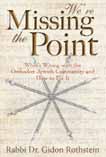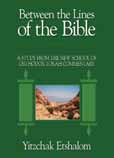We’re Missing the Point/Between the Lines of the Bible: Exodus
We’re Missing the Point: What’s Wrong with the Orthodox Jewish Community and How to Fix It
By Gidon Rothstein
OU Press
Between the Lines of the Bible: Exodus
A Study From the New School of Orthodox Torah Commentary
By Yitzchak Etshalom
OU Press, Urim Publications
Both of these books deal with the theme of redressing major errors in approach in the contemporary Orthodox community, albeit each from a very different perspective.
Rabbi Dr. Gidon Rothstein in We’re Missing the Point: What’s Wrong with the Orthodox Jewish Community and How to Fix It surveys a variety of aspects of the Jewish community, such as its approaches to education and modes of observance and concludes that we are ignoring the fundamental and focusing on the superficial. He prescribes far-reaching remedies.
Rabbi Rothstein argues vigorously and convincingly that we, the Orthodox Jewish community, are “missing the point” in many aspects of our Torah observance. Too often, our educational system and cultural institutions place excessive emphasis on the technical aspects of religious observance while ignoring the transcendent truths and principles that should animate our religious lives. From a thorough study of the classical sources, Rabbi Rothstein identifies those transcendent truths and demonstrates their conspicuous absence in contemporary Orthodox Jewish life.
Rabbi Rothstein isn’t seeking to make Judaism burdensome or restrictive. The old business adage that admonishes us “not to work harder, but to work smarter,” applies to our situation with special poignancy. He proposes a reorientation in approach and attitude that will endow the rituals in which we already engage with new meaning and power. The act of reclaiming the authentic intent and flavor of Torah observance will be liberating and empowering—not burdensome or restrictive.
The author reminds us that, in addition to the highly structured religious framework of precise halachic guidelines, there is another, equally important dimension to observance that requires a human being—Jew or non-Jew—to use personal autonomy, good judgment, and creativity in the service of his Creator. This aspect of religious observance, which cannot be codified in formal fashion, is almost entirely lacking in contemporary Orthodox Jewish life and observance.
The book concludes by presenting practical, compelling ways in which synagogues, schools, and individuals can start on the road to a Judaism closer to the way God meant for it to be.
Rabbi Yitzchak Etshalom in Between the Lines of the Bible: Exodus argues that the approach to Torah commentary for the last two centuries has been overly reliant on midrash at the expense of other traditionally acceptable sources and disciplines, such as literary analysis and archaeology, and he analyzes themes in Exodus in a fresh way using these alternative sources of interpretation.
Between the Lines of the Bible presents a fresh look at many of the themes of the Book of Exodus. We naturally view Torah as timeless, and we tend to think that the approach to parshanut within the Orthodox community has not changed over time. Rabbi Yitzchak Etshalom disagrees.
In his well-reasoned and forceful introduction, he wastes no time in arguing that from the nineteenth century to the present, there was a “break with tradition.” Previously, he states, commentators felt free to adopt either a midrashic or non-midrashic approach to the interpretation of a verse in Tanach (as, for example, in disagreements between Rashi and Ramban). In the modern era, however, “the Orthodox world retreated, by and large, from studying and evaluating the text independently and limited itself to assuming the midrashic strain as being the sole underlying premise of the text.” Rabbi Etshalom attributes this “break with tradition” to historical and communal forces such as the rise of academic Bible study and the desire to insulate Torah study from the skeptics. It is now high time, he argues, to redress the balance. Rabbi Etshalom’s approach utilizes non-midrashic disciplines such as philology, archaeology, and literary analysis to understand the text or its central motif and message. His essays on Pharaoh, Moses, the Ten Commandments, the Mishkan, and other themes in Exodus will excite all who are interested in a fresh and original view of Torah interpretation, which, Rabbi Etshalom would argue, is really a return to the traditional approach.


